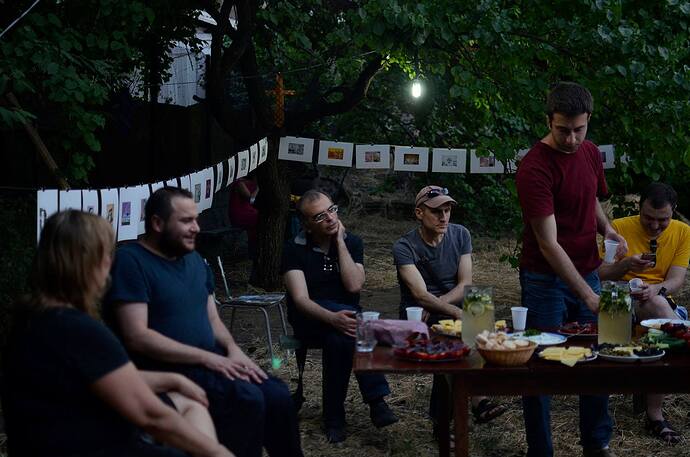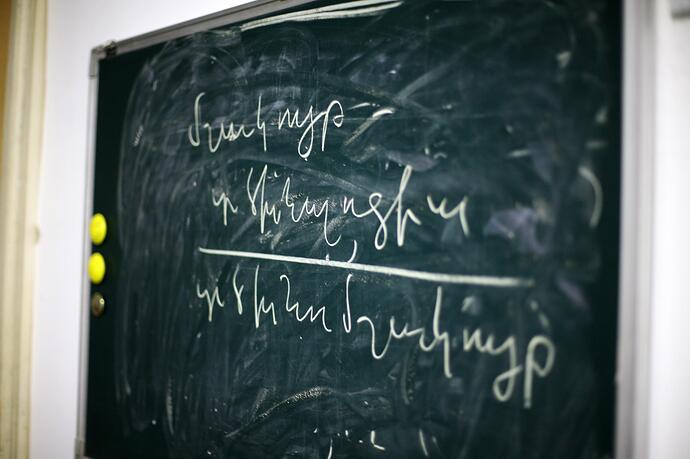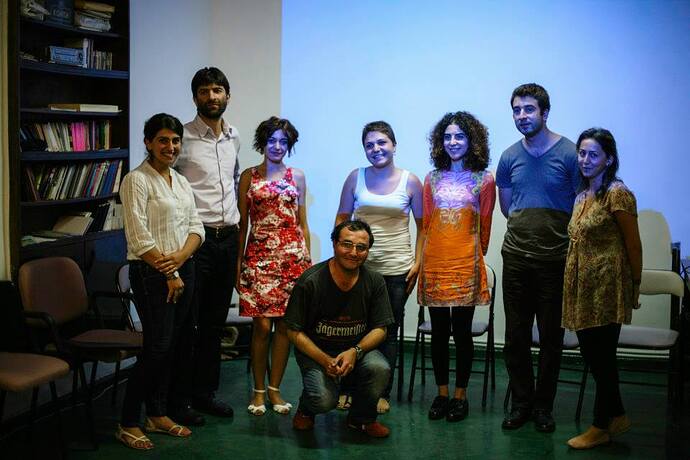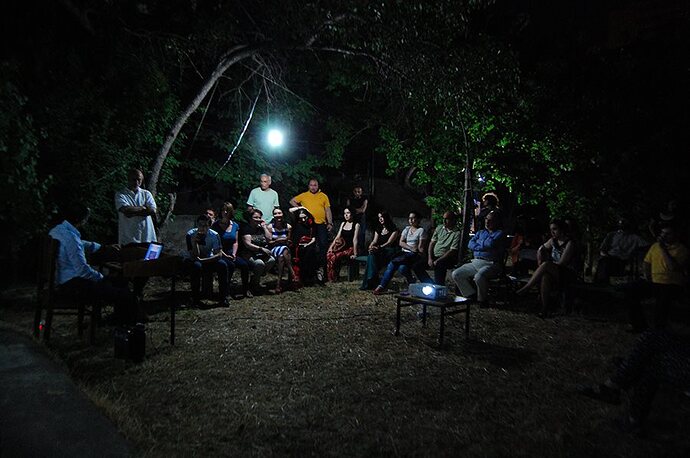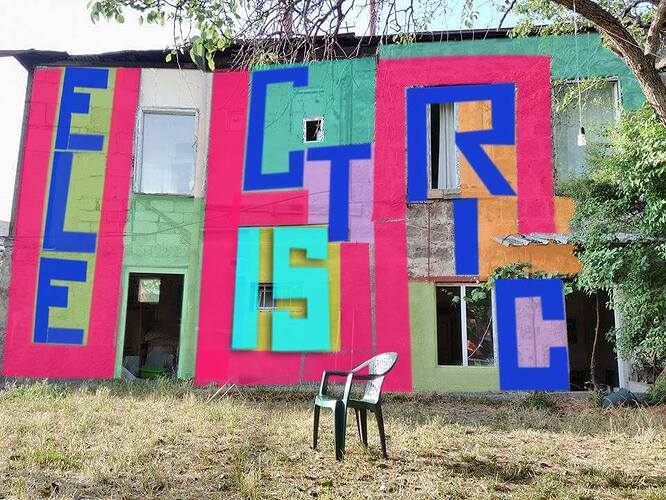Structured as an open cross-functional network of people and ideas/concepts, the Education, Project and Theory Labs of the Institute of Contemporary Art provide a comprehensive set of resources, facilities and tools for understanding and operating in the contemporary art scene in Armenia and the wider global art contexts.
As a part of Education Lab, ICA’s Critical and Curatorial Studies School offers the students an opportunity to get a hands-on/’learn by doing’ knowledge and experience in the main philosophical, political, critical and art theories. This is the only art education program in Armenia offering experimental syllabi and it is led by a faculty of key theorists, curators, artists and arts managers operating in Armenia.
Harnessing the knowledge, skills and tools developed within the Theory Lab and earned through Education program, the students and open attendants gain an opportunity to further bring them into life through Project Lab and transfer it to Theory, analyzing the research results and opening up new space for new texts and the development of new discourses.
Taguhi Torosyan being a friend of mine, I have organised Future Makers’ community event during @Alberto 's visit at ICA gardens on July 18 and naturally I had to write their story as what they do is truly exceptional and it’s a one of a kind project in Armenia. I interviewed Nazareth Karoyan(the founder and director) and Taguhi at ICA and recorded the whole interview(2 hours) and then lost the record, so Taguhi saved the situation by answering some of the questions again, helping me to revive the details and names and thanks to her the case study is now more or less complete.
Who’s involved: Who is in the team? Roles and responsibilities? Skillsets (what are individual team members good at?) Any partnerships?
Taguhi - production manager/strategic development, residency and community program, translation
Nvard - program manager/ communication, event production, graphic and illustration design, photography, promotion, residency program
Harutyun - project lab coordinator / production, logistics, video documentation, translation, international networking, residency program
Narzareth - director/administration of paperwork, basic maintenance, financial issues, strategic development
Our team strives to be non-hierarchic - we do not have a subordination. Each of us doing more or less the same, based on individual skills, but we try to learn new skills and competences, and we also sometimes shift our responsibilities whenever any of us is busy. Nvard is a full-time employee at an IT company and Harut is a freelancer, who had also previously developed the website, whereas Nvard had authored the website design. They had learnt web development and graphic design to develop our website because we had limited resources to commission that work to other professionals. Our duties kind of depend on what we can do and our availability.
Our organizational schedule and planning are short-termed since a long-term planning requires wider resources and funding that we currently don’t have. It’s also summertime so our school is on vacation so we organize ICA TALKS series that does not require bigger budgets like in case of exhibitions.
Basically ICA consists of the school, the theoretical laboratory and the project lab.
At our courses we teach mostly theory of art and art criticism.We have our own point of view which in a way resulted in separation from the mainstream art movement in Armenia. This is the reason we are kind of isolated but we try to be open to the art scene so that all we have done, educating people could serve to the needs of arts in Armenia, to be able to apply their knowledge in the art scene in Armenia.
We got lots of activists in our network of graduates, who are involved in the political scene of Armenia(Teghut activists, Utopiana.am, Gyumri Biennale, etc).
The difference from CCA in Georgia, is that they have intensive international collaboration, whereas the collaboration of ICA with its international network was in a way suspended in recent 3 years, due to internal issues we needed to address in order to maintain the activities of the newly founded organization.
Our Critical and Curatorial Studies program started in 2008 with a 6-month-long experimental class. Meanwhile, our International Summer Seminars for Curators in Yerevan were already being organized since 2006 (the most recent, 7th Edition took place in 2013). Then we organized a 1-year program in 2009-2010. The program transformed into a 2-year program in 2011-2013.
Association of Art Critics of Armenia in 2006 became a member of AICA which founded ICA in Yerevan. In 2012 ICA was founded on the basis of the curators and art critics. The school is one of the programs of AICA. In 2013 we were registered as a foundation and our first course started.
Van Eghyan - a 1960s modernist artist from Yeghegndzor who was one of the most remarkable figures in intellectual circles of the province and educated several generations of artists through his teaching activities at local art school - to create a Memorial Museum and a project lab to revive the arts scene in Eghegnadzor. Fund-raise the money to construct the museum building next to the artist’s house. We also want to initiate an architectural contest for the construction of Van Yeghyan Memorial Museum.
Translation as a community-building practice project centered around the translation of Ignorant Schoolmaster by Jacques Ranciere from French into Armenian, but the community-building didn’t reach it goal in terms of forming a common agenda and working towards achieving it. The aim was to gather around 1000 people around the project and to work together as a community but there were only 30 people in the end. The book was translated by the son of Revolutionary activist and poet Azat Vshtuni, Armen Vshtuni, who is currently homeless but who used to be one of the key influential figures in the beaumonde of Soviet intelligentsia in the 1960s. After receiving an advance the former dandy, who freely speaks English and French, disappeared. A couple years later he contacted me again to start the work. It took him around 1 year and 4 months to translate the manuscript. I’m editing it now. After editing the book will be printed just to give it to the 30 people who were involved.
We are currently working on a new project- Community Art Festival in Tavush region, also including a community art seminar in Dilijan and mapping of regional arts and cultural CSOs and independent initiatives.This was first organized as a diploma work of ‘10 graduates of our school in Ijevan, Tavush.
In Nubarashen district in Yerevan we are working on the creation of Poghos Nubar Contemporary Art Center for the revival of socially, ecologically and culturally deprived suburban (11th) district of Yerevan.
Hypothesis guiding the work: “I believe that to achieve x, we need to do y, through z”
“We believe that to achieve creative freedom we need to decentralize culture through education and community art practices.”
What your main objectives are/why you do this?
“Our main objective is to support the development of creative freedom in Armenia through cultural decentralization, alternative sustainability models and contribution to local and global contemporary art discourses. To achieve that we focus on education in critical and curatorial studies, job of exhibition, community art and civic engagement initiatives as well as writing, translation and publishing of critical literature.”
What you enjoy about the work and what you enjoy less?
"We enjoy the freedom and horizontality of our work process but this also means precarious funding, limited resources, capacities and lack of long-term programming.
We multitask a lot and it is very hard to find qualified specialists who could help us in our routine. Nobody really is willing to volunteer for an art institution in Armenia as they prefer having paid internships that would secure a paid position afterwards or they prefer to pursue their studies abroad."
What kinds of tasks do you do on a regular basis? Yearly, monthly, weekly, daily
“Every day we maintain our institution and residency cluster, work on our project that are on different levels - from pre-production to dissemination of results, follow and make summary of recent events and occurrences n local and global public sphere that can affect or redefine our development strategies and tactics. We host talks, presentations, lectures, discussions and community events on a weekly and monthly basis. Every year, usually in October-June we have our educational program with lectures, seminars, research projects running. Also, we try to support our students with their diploma and final exhibition projects but considering our limited resources it’s a challenge we need to address most of the time.”
What, other than money, do you think could help you in your work?
“First and foremost, human resources(especially expertise in fundraising), a more sustainable communication, networking and collaboration with local and international artists and initiatives.”
What help could you offer others and under which conditions (assuming no money is involved)?
"We have space and facilities that we can provide to artists, curators, critics, arts and cultural managers and interdisciplinary researchers for networking, work and events. We can also provide consulting and assistance in project development, production, post-production and dissemination of results as well as matchmaking. "
How do you go about doing this- what steps are involved? Technologies or processes used?
“Most of the time we apply the ‘learn by doing’ approach assuming that everyone can teach something and everyone can learn something new every day. We also strive to keep up the changing digital technologies and platforms that can optimize our work routine, e.g. we use Asana and Trello for task and project management through Kanban system whenever there’s more time for planning and consideration. But we’re also quite flexible and do things spontaneously, e.g. when there’s an interesting art professional in Yerevan whose practice corresponds to our vision, we might invite her/him for a talk or a more considerate collaboration like a screening program, series of lectures, seminars or an exhibition.”
Costs: What expenses are involved? Who benefits from the work? Who currently supports it, how and why?
“Most of our main activities are currently not supported by third parties, except for the education program (student tuition) and commissioned projects publishing (from research and writing to translation, editing, proofreading, publishing, exhibitions etc.). Our main target groups include youth, art professionals, underrepresented identities, social groups and local communities. Stakeholders also include media, CSOs, suburban and rural communities, our local and international networks and partners as well as the Ministries of Culture, Tourism, Youth, local and municipal governments. The main beneficiary, indeed is the wider society.”
Existing alternatives: Who else is doing similar or relevant work/offering similar things- locally and or elsewhere?
“There are several independent and third-sector initiatives and organizations carrying out networking, residency and representation activities in the field of contemporary art such as Suburb Cultural Center (Eva Khachatryan), Arts and Cultural Studies Laboratory/Art Commune AIR Cluster (Susanna Gyulamiryan), ACOSS residency (Mkrtich Tonoyan), education, publishing and presentation activities like MEDIALAB/Utopiana.am (Vahe Budumyan, Nora Galfayan), AJZ artist-run space (Nvard Yerkanian, Harutyun Alpetyan) that organizes exhibitions, screenings, talks, presentations, discussions and networking, Inknagir Literary Magazine and Club (Violet Grigoryan, Vahan Ishkhanyan) that provides platform form contemporary literature and emerging writers, organizes presentations, events, readings and discussions, publishes translations of critical writers and philosophers. Another new organization is Ashot Johannesian Institute for Human Sciences (Vardan Azatyan, Angela Harutyunyan) that focuses on translation of dissertations by turn-of-the-century Armenian researchers, conducts translation and independent research in the field of critical, cultural studies and contemporary philosophy. I’m not mentioning artistic collectives and groups here because our activities fall into the scope of research, production and dissemination of critical thought and curatorial practice not art production per se.”
Important players affecting the work? (locally and internationally)
“The main players include our local and international partners and networks(Gyumri Biennale, Art Lab, Urban Lab, Inqnagir magazine, Save Teghut civic initiative, etc), corresponding authorities and government bodies, as well as international, mainly European diplomatic agencies and the Eastern Partnership Culture Program.“
Long term perspective: any Business or sustainability plan?
“We are planning to combine local and international funding, membership, commissioning, donation, crowdfunding (for initiatives that fall out of the funding policies and priorities) and social entrepreneurship schemes to continue our activities on a more consistent and large-scale basis.”
Regulation and policy affecting this?
“On the local level its first and foremost the lack of a cultural policy that up till now the government of RA has failed to adopt. This results in centralization, limited transparency, lack of public accountancy and access to decision-making by the third sector in respect to state funds allocation in the field of culture. Lack of considerate vision and actions in respect to the development of creative economy results in poor development of contemporary art market and circulation of capital that would support production and dissemination of contemporary art and critical thought, foster participation of contemporary art from Armenia in key art fairs and festivals abroad, the development of local and regional fairs, festivals, auctions, incentives that would trigger the private sector to expand it’s public promotion priorities from focusing mainly on social charity to opening up also for contemporary art. Tax incentives would trigger emergence of new galleries and art centers, thus resulting in job growth for educated art professionals, especially in the suburbs of capital Yerevan and in provinces of Armenia, contributing to diversity of cultural expression. “
What do you believe are the most important projects locally that are relevant to the work you are doing at this moment?
“Well, the most important are the educational programs, discussions and debates that deal with topical issues in our society, from human rights to urban spaces, ecology, gender and feminist studies, media studies, rule of law, fair administration and freedom of expression. There is a considerate number of such initiatives that support the emancipation of public sphere that is the most important challenge a country like ours should address efficiently.”
